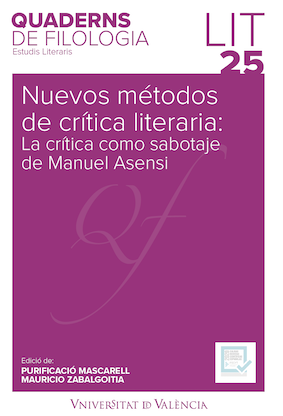Quan el significant traeix al subjecte. Polifonia i sabotatge en Tres almas para un corazón, una novel·la de Guillermina Mekuy Obono (2011)
DOI:
https://doi.org/10.7203/qdfed.25.18984Paraules clau:
poscolonialismo, feminisme, crítica com a sabotatge, model de món, Guinea Equatorial. Resum
Resum
Aquest article analitza Tres almas para un corazón (2011), novel·la de l'escriptora guineoecuatoriana Guillermina Mekuy. La idoneïtat de la crítica com a sabotatge per a aquesta investigació resideix en l'anàlisi del sil·logisme afectiu com a manera i origen del model de món del discurs, així com l'atenció a l'autor, en tant subjecte complex, responsable d'aquest model. Aquesta novel·la és presentada per la seua autora com una pràctica feminista i decolonial. No obstant això, la crítica com a sabotatge mostrarà com tal perspectiva es dilueix en l'anàlisi de la seua materialitat significant, on es reafirma el model de món modern/colonial de gènere, fet que contradiu la voluntat conscient de l'escriptora.
 Descàrregues
Descàrregues
Descàrregues
Publicades
Com citar
-
Resum442
-
PDF (Español)348
Número
Secció
Llicència
 Este obra está bajo una licencia de Creative Commons Reconocimiento-NoComercial-SinObraDerivada 4.0 Internacional.
Este obra está bajo una licencia de Creative Commons Reconocimiento-NoComercial-SinObraDerivada 4.0 Internacional.
Tots els documents inclosos a OJS són d'accés lliure i propietat dels seus autors i/o institucions editores, i per tant, qualsevol acte de reproducció, comercialització, comunicació pública o transformació total o parcial necessita el consentiment exprés i escrit d'aquests.
________
Authors who publish with this journal agree to the following terms:
- Authors retain copyright and grant the journal right of first publication with the work simultaneously licensed under a Creative Commons Attribution License that allows others to share the work with an acknowledgement of the work's authorship and initial publication in this journal.
- Authors are able to enter into separate, additional contractual arrangements for the non-exclusive distribution of the journal's published version of the work (e.g., post it to an institutional repository or publish it in a book), with an acknowledgement of its initial publication in this journal.
- Authors are permitted and encouraged to post their work online (e.g., in institutional repositories or on their website) prior to and during the submission process, as it can lead to productive exchanges, as well as earlier and greater citation of published work (See The Effect of Open Access).




